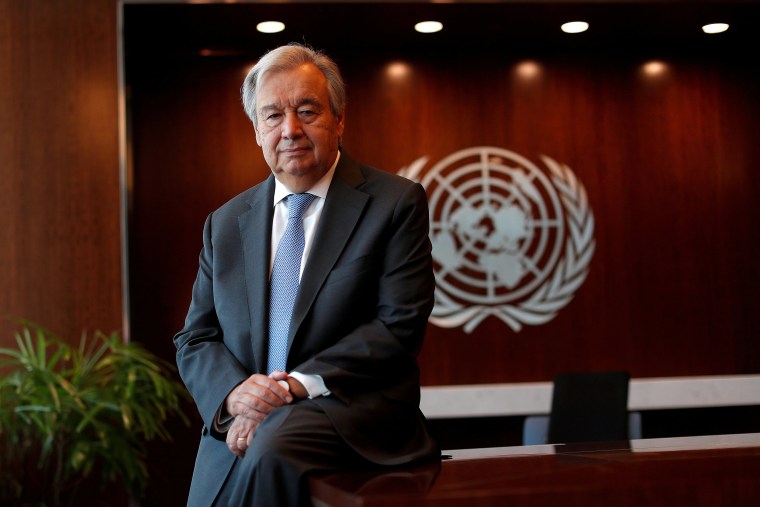UNITED NATIONS — Born out of World War II’s devastation to save succeeding generations from the scourge of conflict, the United Nations officially marks its 75th anniversary Monday at an inflection point in history, navigating a polarized world as it faces a pandemic, regional conflicts, a shrinking economy and growing inequality.
Criticized for spewing out billions of words and achieving scant results on its primary mission of ensuring global peace, the U.N. nonetheless remains the one place that its 193 member nations can meet to talk.
And as frustrating as its lack of progress often is, especially when it comes to preventing and ending crises, there is also strong support for its power to bring not only nations but people of all ages from all walks of life, ethnicities and religions together to discuss critical issues like climate change.
Secretary-General Antonio Guterres, looking back on the U.N.’s history in an AP interview in June, said its biggest accomplishment so far is the long period during which the most powerful nations didn’t go to war and nuclear conflict was avoided. Its biggest failing, he said: its inability to prevent medium and small conflicts.

Monday’s mainly virtual official commemoration will not be a celebration. It will include a declaration on the U.N.’s 75th anniversary, approved by diplomats from all U.N. member states after sometimes heated negotiations. Then, representatives from over 180 countries are expected to deliver pre-recorded speeches lasting three minutes.
The declaration recalls the U.N.’s successes and failures over more than seven decades and vows to build a post-pandemic world that is more equal, works together, and protects the planet.
“The urgency for all countries to come together, to fulfill the promise of the nations united, has rarely been greater,” it says, while praising the United Nations as the only global organization that “gives hope to so many people for a better world and can deliver the future we want.”
Even at times of great tension, it says, the U.N. promoted decolonization, freedom, development, human rights and equality for women and men, “and worked to eradicate disease.” And it “helped mitigate dozens of conflicts, saved hundreds of thousands of lives through humanitarian action and provided millions of children with the education that every child deserves.”
As for disappointments, the declaration says the world “is plagued by growing inequality, poverty, hunger, armed conflicts, terrorism, insecurity, climate change and pandemics.” It says the poorest and least developed countries are falling behind, decolonization is not complete, and people are forced to make dangerous journeys in search of refuge.
“It’s very unfortunate that it’s going to be a pretty gloomy celebration for the U.N,” said Richard Gowan, U.N. director for the Crisis Group, a Brussels-based think tank.
He said the declaration was weakened by U.S. opposition to strong language on climate change, and negotiations were delayed because the United Kingdom and others objected to China trying to insert language into the document, a reference to Beijing’s now hallmark phrase “win-win” which was not included.
“Although it was pretty minor, that captures the real question that has emerged over the U.N. in 2020, exacerbated by COVID, which is how is this organization going to navigate an era of U.S.-China tension,” Gowan said.
“There is a real sense that China has taken advantage of the Trump administration’s relative disengagement from the U.N. to increase its influence here,” he told a media briefing.
Download the NBC News app for the latest news on the coronavirus
To mark its 75th anniversary, the United Nations launched “a global conversation” in January using surveys, polls, online and in-person gatherings to find out what all kinds of people were thinking about the future. The results, which secretary-general called “striking,” were released Monday.
According to the results, over one million people from all 193 U.N. member nations took part, including 50,000 people in 50 diverse countries who were part of a scientific poll.
“People are thinking big — about transforming the global economy, accelerating the transition to zero carbon, ensuring universal health coverage, ending racial injustice and ensure that decision-making is more open and inclusive,” the U.N. chief said. “And people are also expressing an intense yearning for international cooperation and global solidarity - and rejecting go-it-alone nationalist approaches and divisive populist appeals.”
Guterres said the 75th anniversary is an ideal time to realize these aims.
“We face our own 1945 moment,” he said. “We must meet that moment. We must show unity like never before to overcome today’s emergency, get the world moving and working and prospering again.”
